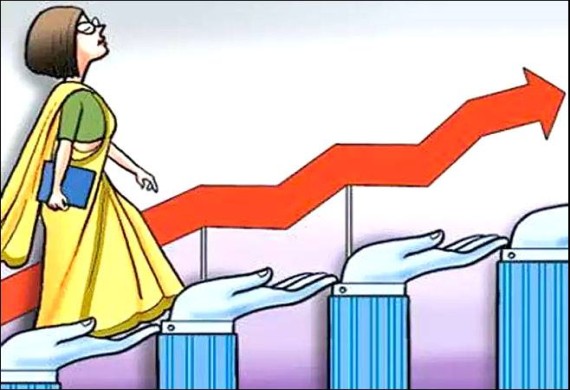
The Evolution of Women Entrepreneurs
By: Sruthi, Writer, WomenEntrepreneurIndia
Indians, regardless of profession, have always been entrepreneurs. Since the dawn of time, businesses have been passed down from father to son, and they have developed from rags to riches. Because of male dominance in society, women have not been able to reach their full potential. They were barred from joining the family company or creating their own due to patriarchy and other cultural traditions. Women were in charge of doing routine chores, caring for children and elderly members of the household. Women's entrepreneurship plays a critical part in a country's economic growth and contributes greatly to the country's prosperity. If women's entrepreneurship is ignored and they are not permitted to participate in economic activities, the country's growth would be extremely slow.
Women are the fastest-growing segment of the country's entrepreneurial population. Women's entrepreneurship has long been recognised as an important contributor to the economy. They generate new occupations for themselves and others, and they come up with extraordinary solutions to society's management, organisational, and business problems. They make important contributions to the economy by enhancing the well-being of families and communities, eradicating poverty, and empowering women.
Women Entrepreneurs – Ancient to Modern Period
The concept of entrepreneur emerged in the nineteenth century, specifically the term "women entrepreneurs." The origins of entrepreneurship may be traced back to ancient India.
18th Century
In the mid-eighteenth century, Indian women managed retail shops, small handloom enterprises, and other businesses. More women broke free from society's constraints and began to soar into the spotlight during the 18th and 19th centuries. However, prior to the twentieth century, women supplemented their income by creating a business.
19th Century
Women were encouraged to start small companies from the comfort of their own homes during this time period. Many of them started some of their own enterprises. To boost their income, they took up jobs like making papads (wafers), pottery, and bangles. During this historical period, there was also a need for children to be educated. In certain locations, families began sending their daughters to school alongside their male children.
20th Century
Women's participation and contribution were highly noticeable in the early twentieth century. The number of businesswomen has grown, notably during the 1990s. Women stepped up to apply new skills, invest, locate a market niche, and generate significant employment or other possibilities. Females began to operate small businesses such as xerox shops and grocery stores. This decade witnessed tremendous advancements as well as the greatest triumph for women in business.
Women Entrepreneurs Strengthens India's Entrepreneurial Ecosystem in Modern Day
Women in India have come a long way as entrepreneurs, standing shoulder to shoulder with some of the most influential men in today's business world. They have overcome several gender inequities and beyond the bounds of housework not only by working but also by becoming employers throughout the years. They are no longer strangers to business!
Women have broken through barriers by finding success with start-ups or beginning on a road to become independent consultants, from operating home-based enterprises to growing established firms. A substantial portion of this transition may be ascribed to fintech businesses that provide equal growth opportunities to women and encourage them to become job creators.
Indifi Technologies, one of India's top MSME lending platforms, is one such firm that is expediting women's entrepreneurial journeys by effortlessly giving them capital to establish or expand their enterprises.
Indifi has successfully granted over 38,000 loans to various enterprises since its start, with about 20% of the loans going to companies with female promoters. 75% of the loans went to women entrepreneurs in tier 1 cities, while the remaining 25% went to women entrepreneurs in tier 2/3/4 cities, with an increase in women-led enterprises in metros and tier 1 cities. As more women-led firms emerge from smaller cities, the mix is projected to shift.
Women are not only brilliant entrepreneurs, but they also have superior credit profiles, according to the company, with nearly 50% greater monthly turnover than male enterprises, which helps to develop a healthy credit profile. According to Indifi's data, the majority of women entrepreneurs seeking credit are in the e-commerce and food (restaurant) industries, accounting for 45 % of all disbursals. Indifi also offers specific discounts to women-owned companies as part of its recent partnership with Facebook, which includes a 0.02 % interest rate decrease.
Mr.Alok Mittal, CEO & Co-founder of Indifi, said, “Fintech startups have recognized the value of women not only from an employment perspective but also encouraging them by developing products keeping their needs and requirements in mind. At Indifi, we strongly believe that such opportunities are pivotal in empowering women to make greater decisions and make better choices, inspiring many others through their success stories. And by ensuring their equal involvement and empowerment, fintech players are doing a great job in serving the underserved and driving financial inclusion across the country. We hope our country’s women follow their passion with grit and grace to reach new entrepreneurial heights. We are immensely proud to help them in their endeavours.”
According to a survey, women-owned firms in India are predicted to increase by up to 90% in the next five years, compared to similar enterprises in the United States and the United Kingdom, which are expected to grow by 50% and 24%, respectively. In reality, about 80% of women in semi-urban and rural India who become entrepreneurs report a considerable increase in their socio-economic and cultural standing. Thanks to the government and corporate companies such as Indifi, who are collaborating and making a substantial contribution to women's empowerment in India through a variety of projects.
Women have become equal participants in a myriad of areas at all levels of society. Women have entered the industrial sector and garnered renown both inside and outside of the country. More female leaders will enter new sectors in the future. It will enhance their earnings and give them a sense of accomplishment.


.jpg)



